LAB's publications
For the past 40 years, LAB has published a range of books on social, political, environmental, economic and cultural issues in Latin America.
In 2015, LAB started a publishing partnership with Practical Action Publishing. All new LAB publications are co-publications with our new partner, who produce, promote, sell and distribute the titles on LAB’s behalf, freeing us to do what we do best: define themes, identify authors, commission, translate (where necessary) and edit wonderful new books. Meanwhile, Practical Action Publishing has also taken over distribution of all LAB’s in-print books and has digitised well over 100 LAB titles from LAB’s back catalogue. Many are available as e-books, either to individual order, or via a subscription. For a full list of available titles and to place an order, click here.
Universities, libraries and institutions interested in gaining access to all LAB’s titles can do so (at a very humble price) via Practical Action Publishing’s e-Library. The service is completely tailored, so you could buy access to the entire collection of Practical Action Publishing publications, or to the entire LAB collection, or to five books of your choice, for example. Get in contact for more info.
Latest publications
Clamor: The search for the disappeared of the South American dictatorships
by Jan Rocha
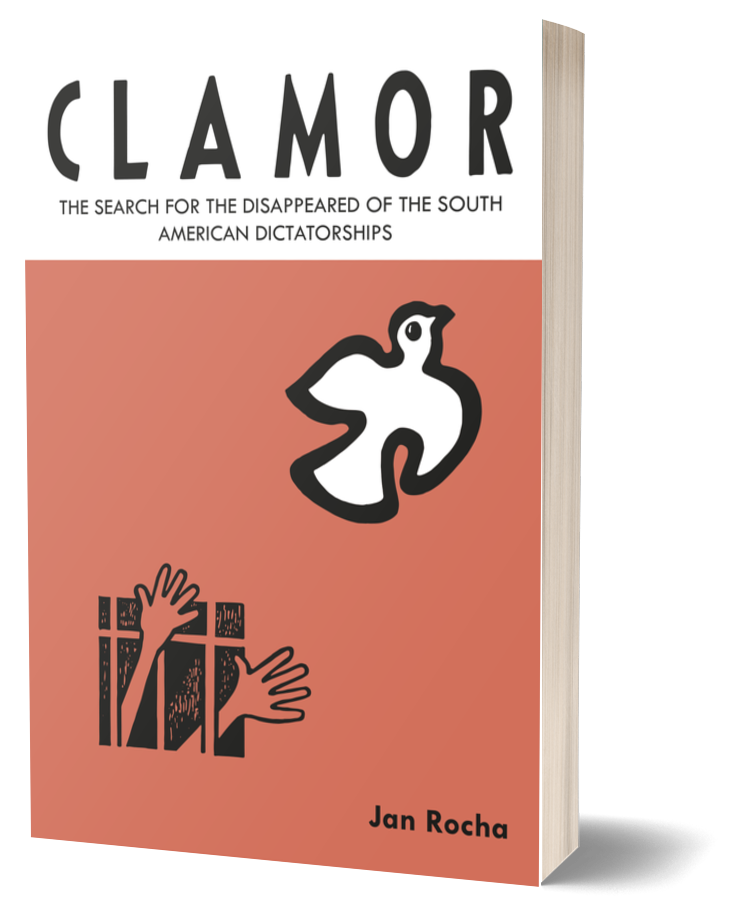 Pinochet’s dictatorship in Chile is relatively well known in the UK, but what happened during the Argentine dictatorship, 1976-83, when thousands of men, women, and children were subjected to state terrorism, remains largely unknown. The book describes the secret detention camps, the disappearances, the kidnapping of hundreds of babies and small children. It is based largely on eyewitness accounts gathered by CLAMOR, an ecumenical group of volunteers in São Paulo, Brazil which was backed by the Catholic church and the World Council of Churches. The group was instrumental in finding the first ‘disappeared’ children to be located, and contributed to the search for many others.
Pinochet’s dictatorship in Chile is relatively well known in the UK, but what happened during the Argentine dictatorship, 1976-83, when thousands of men, women, and children were subjected to state terrorism, remains largely unknown. The book describes the secret detention camps, the disappearances, the kidnapping of hundreds of babies and small children. It is based largely on eyewitness accounts gathered by CLAMOR, an ecumenical group of volunteers in São Paulo, Brazil which was backed by the Catholic church and the World Council of Churches. The group was instrumental in finding the first ‘disappeared’ children to be located, and contributed to the search for many others.
The book also covers the situation in the other South American countries ruled by military dictators, Uruguay, Paraguay, Chile and Bolivia, where CLAMOR supported local human rights organizations and sent missions. The group was one of the first organizations to denounce the collaboration between the security forces of the dictatorships, involving cross-border kidnappings, torture and murder of dissidents, which later became known as Operation Condor.
Clamor’s work involved careful, daring and at times dangerous work, and this book has the intensity and excitement of a crime or spy thriller. As a founder member of CLAMOR, with access to all the archives, Jan Rocha, Journalist and former Correspondent for the BBC and the Guardian, is in a unique position to tell its story. She concentrates on eyewitness accounts, including her own, and on the question of the children, not only those kidnapped, but those left behind when their parents disappeared.
In the midst of the dictatorship, when they called us madwomen, one of our first destinations abroad was Brazil, to visit Clamor, where we immediately felt shielded and helped. Besides proving the coordination of the South American dictatorships, we discovered an enormous regional solidarity, ignoring frontiers, between victims, their families and people committed to justice and human dignity. And all this was due to a great extent to that first contact with Clamor.
– Estela Barnes de Carlotto, president of the Grandmothers of the Plaza de Mayo, Buenos Aires
Moving Forward: Health, care and violence seen through the eyes of displaced Venezuelan women in Brazil by Pia Riggirozzi, Bruna Curcio, Tallulah Lines, Natalia Cintra
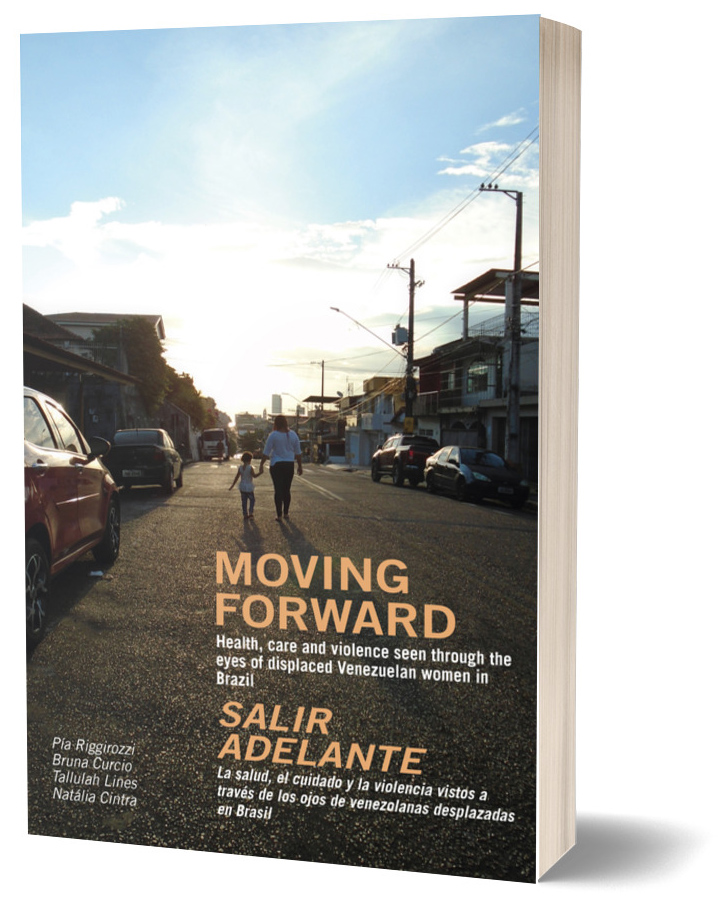
Compiling photographs and testimonies from Venezuelan women displaced in Brazil, ‘Moving Forward’ offers a candid and often shocking insight into migrant women’s experiences. It specifically looks at the challenges these women face, their vulnerabilities, and their unwavering dedication to their families and communities in the face of adversity through three main themes: caregiving and self-care; gender-based violence; and barriers to sexual and reproductive healthcare.
It calls to attention the failures of programmes designed to protect migrant women and girls, and the need for responsive, gendered, and culturally-sensitive policy to support them.
‘Moving Forward’ is an accessible book for the general public as well as students and policymakers committed to women’s rights, sexual and reproductive health, and the gendered experience in South-South corridors of migration.
The bilingual photobook is available in two editions: one, Moving Forward / Salir Adelante, in English/Spanish and another, Seguir Adiante/Salir Adelante, in Portuguese/Spanish.
Moving and profound. Moving Forward is an invitation to see forced displacement and the struggle for equal rights through the eyes of displaced women and is also a call to make their journeys and their lives more visible.
– Leiza Brumat, Eurac Research
The Heart of Our Earth: Community Resistance to Mining in Latin America by Tom Gatehouse
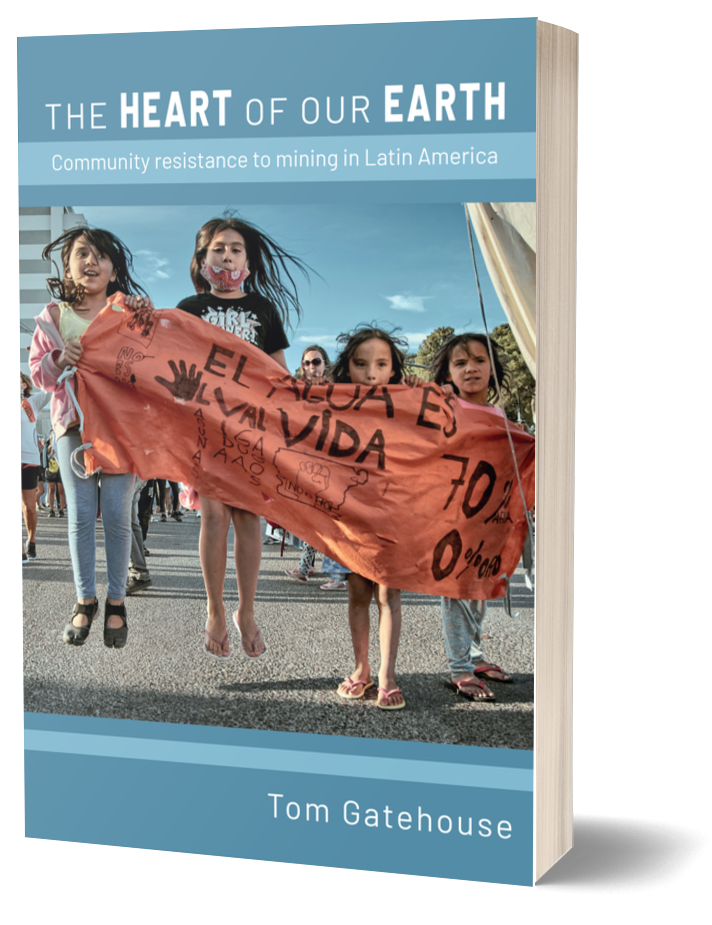 In recent decades, the mining industry has taken on vast new dimensions, becoming far more powerful and destructive than anything seen in earlier periods. Mining companies have ventured into ever more remote and ecologically sensitive areas, bringing about unprecedented social and environmental changes: entire landscapes have been radically transformed, and lifestyles which have changed little in centuries have, in some cases, disappeared altogether.
In recent decades, the mining industry has taken on vast new dimensions, becoming far more powerful and destructive than anything seen in earlier periods. Mining companies have ventured into ever more remote and ecologically sensitive areas, bringing about unprecedented social and environmental changes: entire landscapes have been radically transformed, and lifestyles which have changed little in centuries have, in some cases, disappeared altogether.
But as mining has expanded, so has social conflict, with frontline communities mobilizing in defence of their lands, water, livelihoods, and cultures: in roadblocks and research; sabotage and street theatre. While some communities have paid a heavy price for their opposition, others have achieved some impressive victories. The Heart of Our Earth tells their story: how the mining industry has affected them, how they have fought back, and their visions for fairer and more sustainable futures.
Written in clear, non-technical language, The Heart of Our Earth is for students, academics, activists, journalists, and anyone who has ever wondered about the true costs of the metals which increasingly power our lives.
A parable for our times.
– Dr John Crabtree, University of Oxford
In The Heart of Our Earth, Gatehouse does what he does best: highlight the voices and power of movements making change.
– Dr Kirsten Francescone, Trent University, formerly MiningWatch Canada.
Women Resisting Violence: Voices and Experiences from Latin America by the WRV Collective
 Women’s voices are loud and clear: gendered and intersectional violence is rampant in Latin America. But at the grassroots, we are pushing back. As the Mexican proverb boldly states, ‘They wanted to bury us, but they didn’t know we were seeds.’
Women’s voices are loud and clear: gendered and intersectional violence is rampant in Latin America. But at the grassroots, we are pushing back. As the Mexican proverb boldly states, ‘They wanted to bury us, but they didn’t know we were seeds.’
In Women Resisting Violence, case studies and interviews with women leaders from Latin America highlight the multiple and intersecting forms of gendered violence – where race, ethnicity, skin colour, economic status, and other markers combine to identify, discriminate against, and target women. Collecting a chain of voices, the collective focuses on these women’s inspirational strategies for transforming their communities and influencing international laws. Their testimonies underline the importance of culture, commemoration, and the arts in consolidating and amplifying active resistance.
This highly accessible book is concerned with one of the most important issues in Latin America today and in the future.
– Caroline Moser, University of Manchester/University College London
This book demonstrates, once again, the significance of the bonds of sisterhood between academic and Indigenous feminists proposing creative forms of resistance and theorizing from the South.
– Rocío Silva Santisteban, Peruvian poet, feminist activist, scholar, and former member of Congress
Crossed Off The Map: Travels In Bolivia by Shafik Meghji
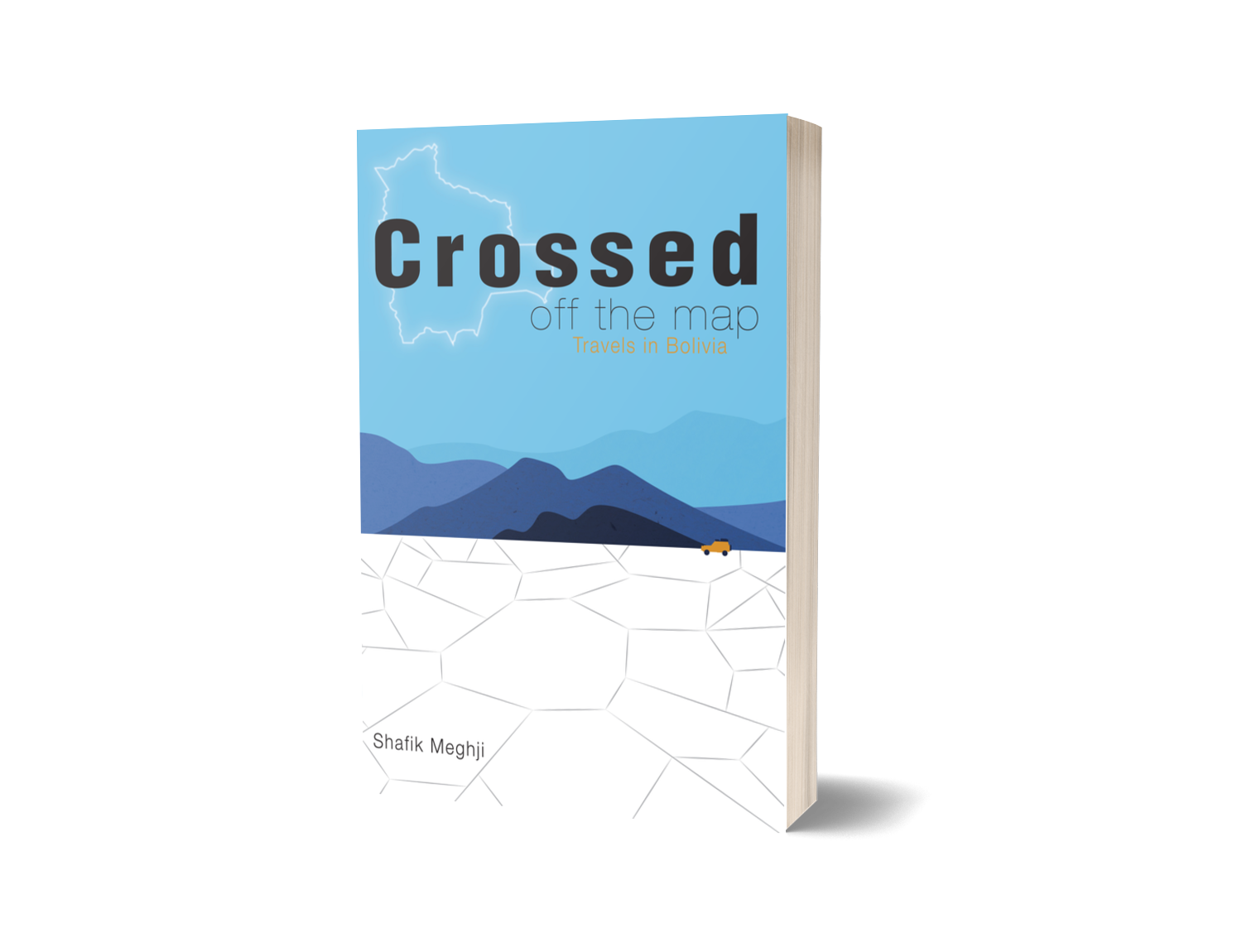
Blending travel writing, history and reportage, Crossed Off The Map journeys from the Andes to the Amazon to explore Bolivia’s turbulent past and contemporary challenges.
It tells the story of the country’s profound and unexpected influence on the wider world over the last 500 years – fragments of history largely forgotten beyond its borders. The book also explores how ordinary Bolivians in and around the world’s highest city, largest salt flat, richest silver mine and most biodiverse national park are coping with some of the touchstone issues of the 21st century: the climate emergency, populism, mass migration, indigenous rights, national identity, rapid urbanisation, and the ‘war on drugs’.
Crossed Off The Map is an amazing book. I’ve discovered so much more of my own country through it.
It makes you realise the wonder of Bolivia.
– Sergio Mendoza, journalist for La Nube and Bloomberg News
Following in the footsteps of everyone from Che Guevara, conquistadors and colonialists, to Inca pilgrims and even dinosaurs, Meghji is a wonderful travelling companion, bringing to life a Bolivia rarely seen in such bright and beautiful light.
– Monisha Rajesh, author of Around the World in 80 Trains
Mexico Inside Out by Nick Caistor
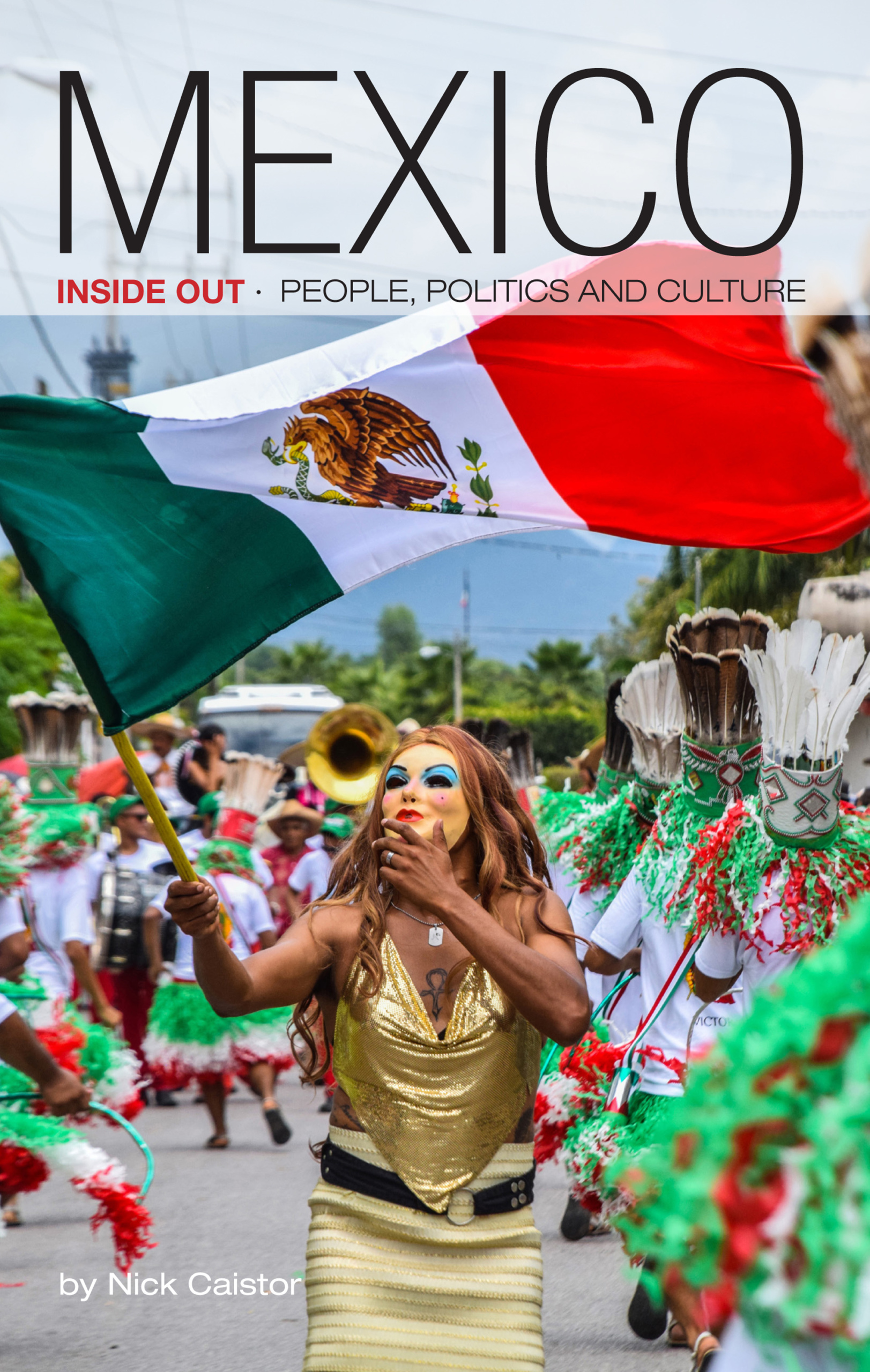 This short book (the second in our ‘Inside Out’ country guide series, following on from Brazil Inside Out (2016)) offers an up-to-date analysis of many aspects of life in Mexico today. It includes a look at Mexico’s geography and history; its peoples, economy and cultural life; and the political problems facing the current administration, from drugs violence to severe environmental challenges.
This short book (the second in our ‘Inside Out’ country guide series, following on from Brazil Inside Out (2016)) offers an up-to-date analysis of many aspects of life in Mexico today. It includes a look at Mexico’s geography and history; its peoples, economy and cultural life; and the political problems facing the current administration, from drugs violence to severe environmental challenges.
President López Obrador has promised to achieve the country’s ‘fourth transformation’: Mexico Inside Out examines what that means and requires. Mexico Inside Out provides an introduction to the country for student and traveller alike, all those who want to know more about the real Mexico than is found in an ordinary guidebook.
The richness and complexity of Mexican history, politics and culture made extraordinarily readable without simplification.
A great introduction to Mexico.
– Professor Jenny Pearce, London School of Economics
A readable and deeply informed guide to contemporary Mexico, its dramas and its beauty.’
– David Lehmann, Cambridge University
Book websites
LAB is innovative in the form and delivery of news.
Unlike other publishers, LAB creates ‘book websites’ which are regularly updated with multimedia content to extend the scope and lifetime of the books we publish and increase their accessbility.
Voices of Latin America
Voices of Latin America: Social Movements and the New Activism was published in London in January 2019 and in New York (in association with Monthly Review Press) in May 2019. It reaches those curious about visiting, studying or researching the region, and is used as essential reading in undergraduate and post-graduate courses throughout the English-speaking world. The book is accompanied by a special website which has a page for each chapter/theme, with details of the authors, interviewees, references, further reading, videos and the latest news relating to the chapter. A 2021 webinar series updated readers on progress to these campaigns since the publishing date and offered readers the chance to engage with changemakers in Latin America.
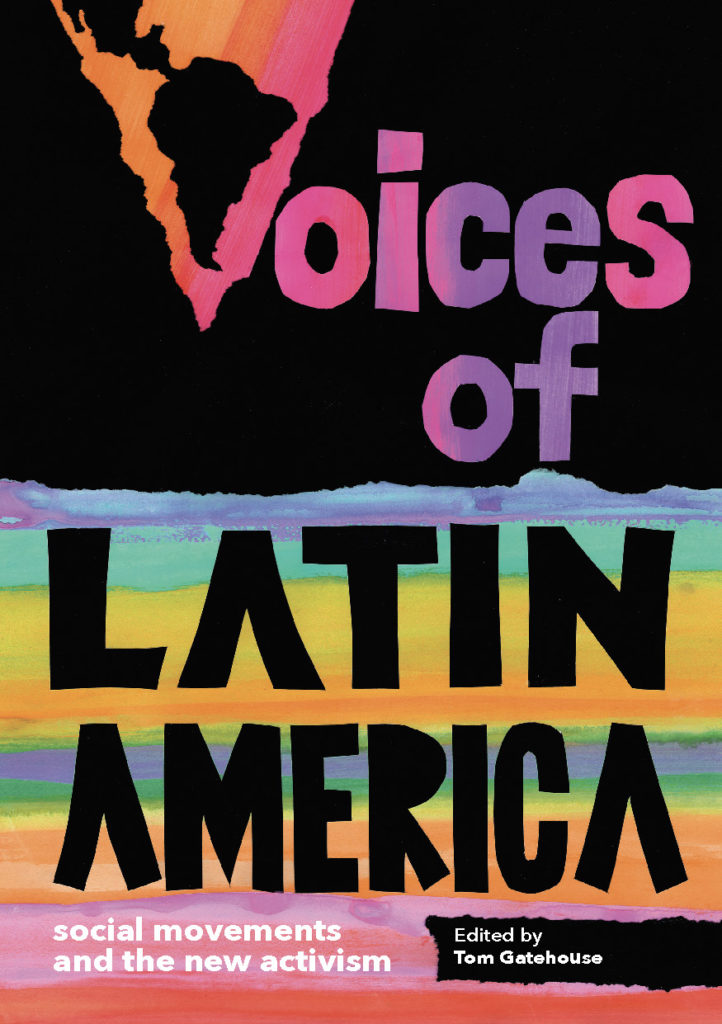
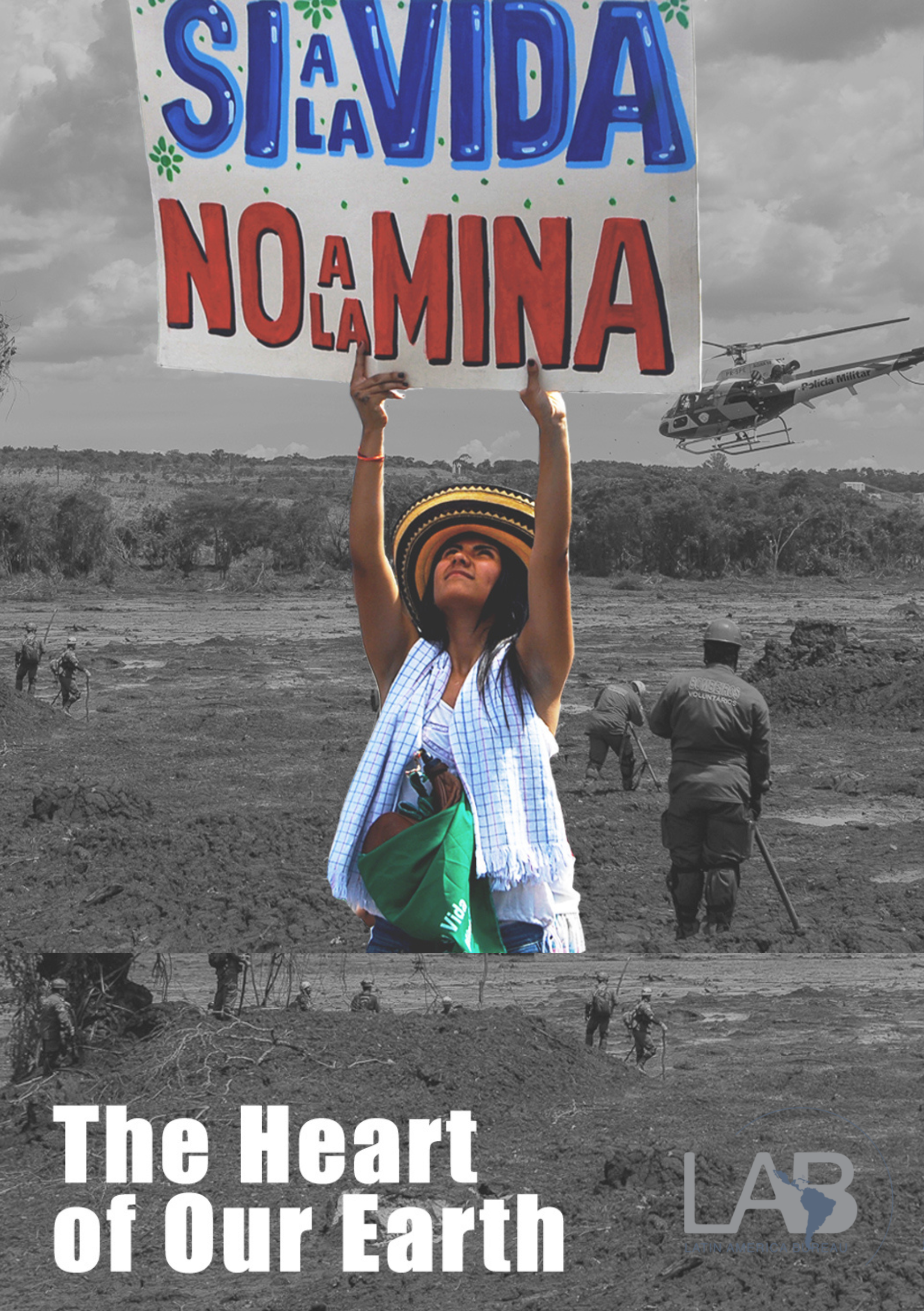
The Heart of Our Earth
Following a major crowdfunding campaign, the book website provides up-to-date news on mining and resistance to it in the region, told through compelling, straightforward language you don’t need to be an expert to read, as well as impactful videos and images explaining the activities of multinational mining companies in Latin America and the effects on local communities. We hope the book and website will reach students and academics working in disciplines such as geography and development studies; journalists, NGOs, and businesses doing work in the region on mining and other extractive industries; activists, campaigners, and members of social movements everywhere who wish to learn from the Latin American experience; and investors concerned with understanding what their money is used for.
Women Resisting Violence
Women Resisting Gendered and Intersectional Violence explores and celebrates grassroots campaigns and organisations that counter violence against women and girls in Latin America. The project comprises a podcast series, a policy workshop, a book, to be published in 2022, and a website to tie them all together. Here you can find detailed profiles of organisations and campaigns mitigating violence against women, relevant videos, blog posts and news from the region, as well as links to important research from our partners. Given that evidence demonstrates the intersection of gender-based violence against women and girls with many other forms of violence, this project keeps an intersectional perspective and ultimately hopes to positively influence broader policies around violence against women.
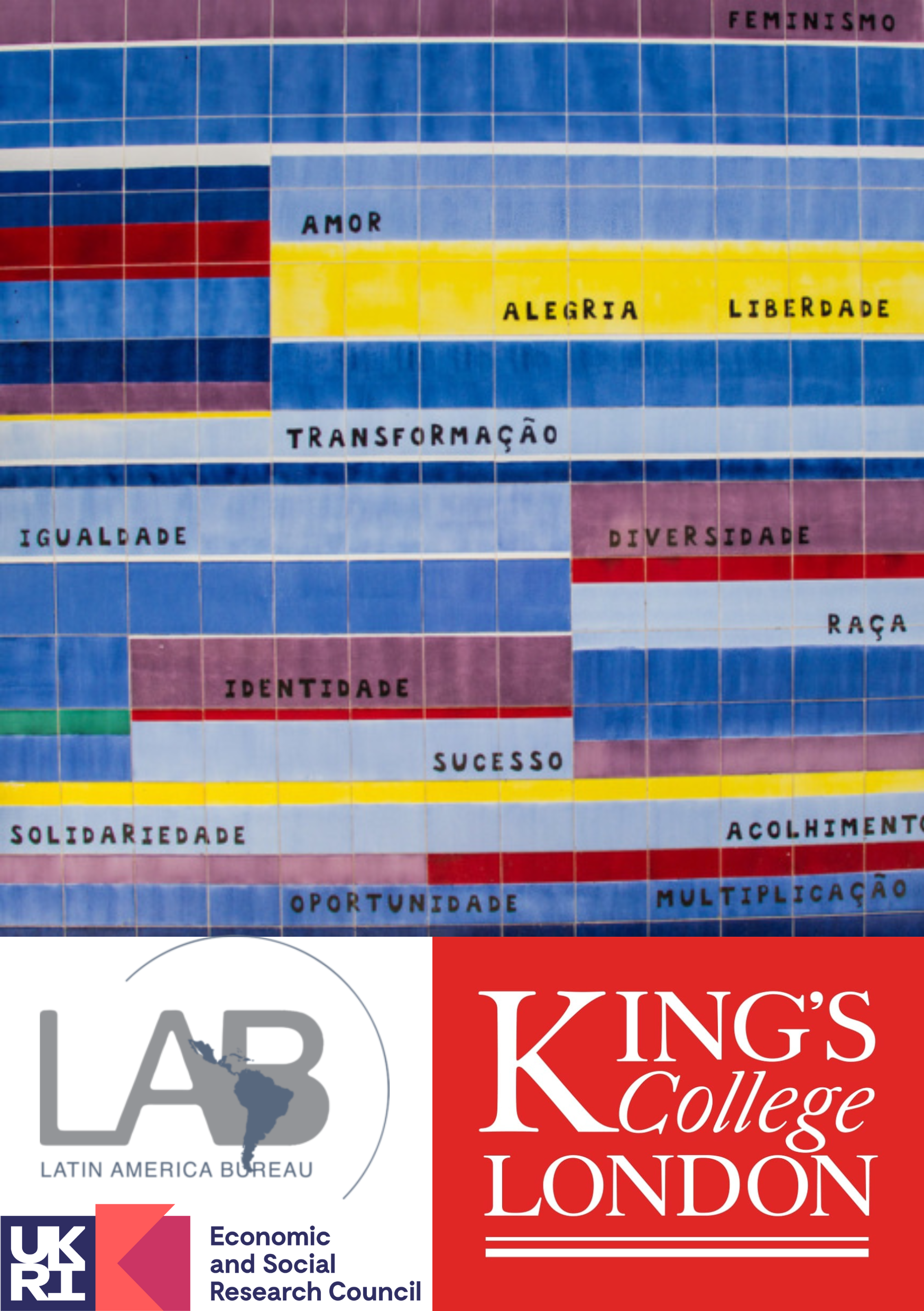
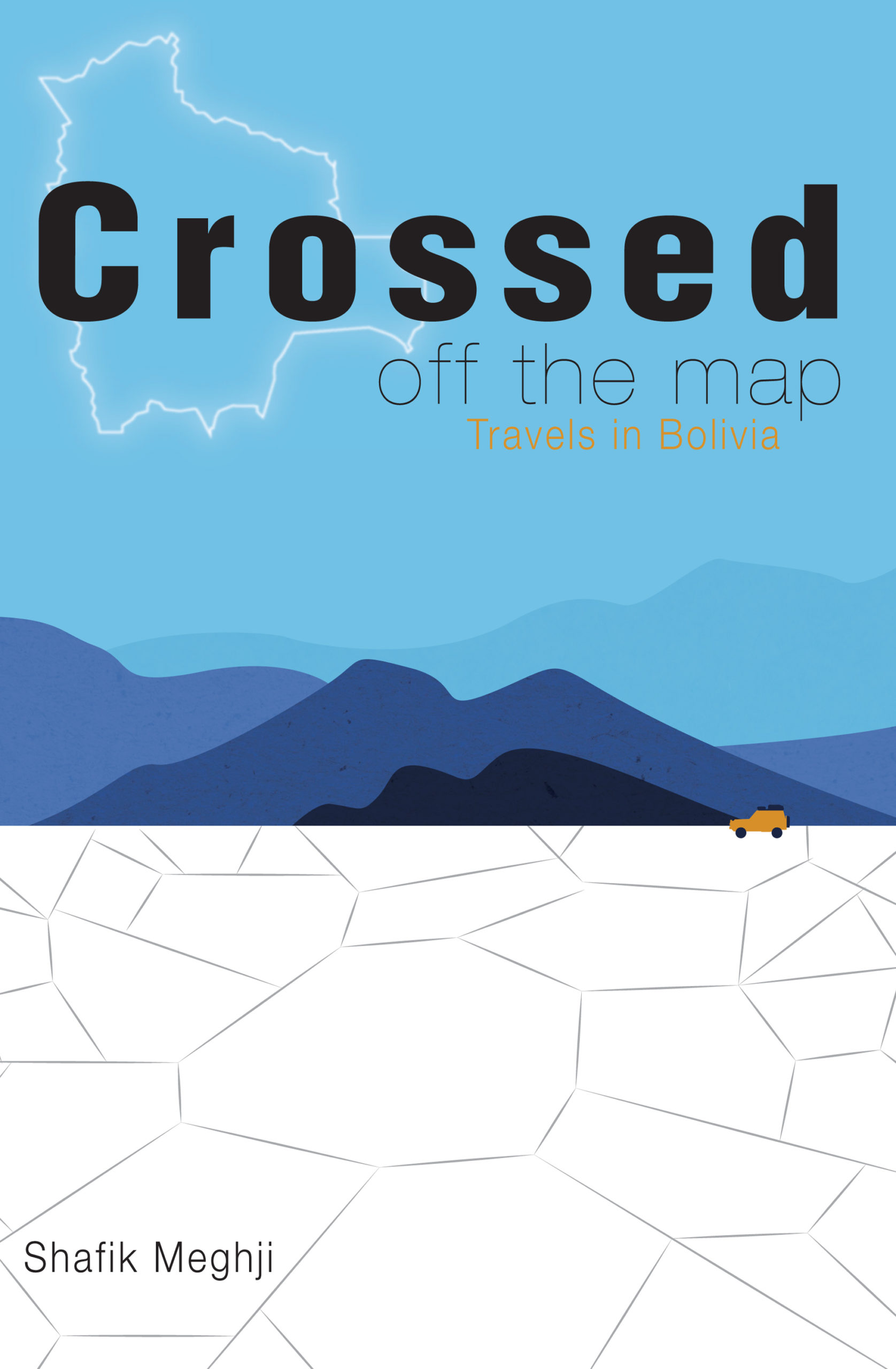
Crossed Off The Map – Travels in Bolivia by Shafik Meghji
A journey across Bolivia, from the Andes to the Amazon, explores the country’s turbulent history and current challenges. It tells the improbable – and, outside of South America, largely unknown – story of how Bolivia was once one of the richest places on earth, kickstarted globalisation, influenced the industrial revolution in Europe and dynastic collapse in China, and played host to everyone from rubber barons to Che Guevara. Published 15 March 2022.
